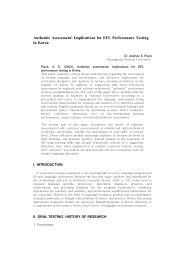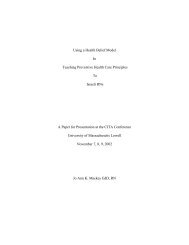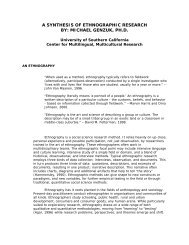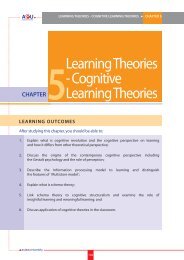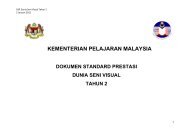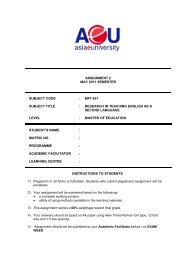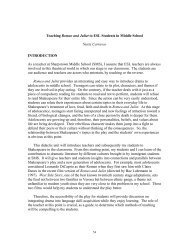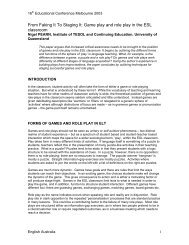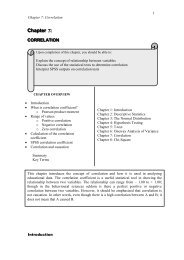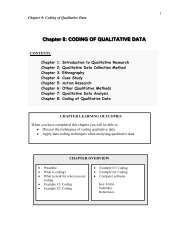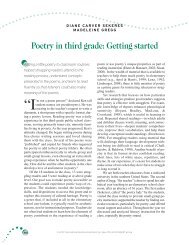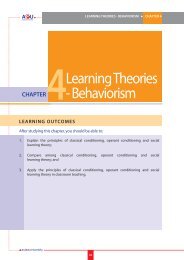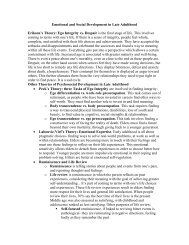Learning Theories - Cognitive Learning Theories CHAPTER
Learning Theories - Cognitive Learning Theories CHAPTER
Learning Theories - Cognitive Learning Theories CHAPTER
Create successful ePaper yourself
Turn your PDF publications into a flip-book with our unique Google optimized e-Paper software.
<strong>CHAPTER</strong> 5 l LEARNING THEORIES - COGNITIVE LEARNING THEORIES<br />
Decay<br />
• Decay is the passive loss of the memory trace due to inactivity or lack of rehearsal.<br />
Actually this is not a new idea.<br />
• Thorndike has postulated three major laws of learning and one of it is law of exercise.<br />
In this law, Thorndike stated that the more an S – R connection is used, the stronger<br />
it becomes; conversely, the less it is use the weaker it becomes.<br />
• Hence, through inactivity, the S – R connection simply weaken over time.<br />
Interference:<br />
• Interference takes place when the recall of one event is inhibited by the incursion of<br />
another event.<br />
• There are two types of interference that is proactive and retroactive interference.<br />
• Proactive inhabitation occurs when you fail to learn subject B because of subject A,<br />
which you learned earlier, because it disrupted your recall of the facts in subject B.<br />
• Retroactive interference occurs when the learning of new material (B) prevents the<br />
recall of the older material (A).<br />
Explain briefly the three stages multi-store model of memory by<br />
Atkinson and Schriffin.Discuss how teacher can help student<br />
memorize important facts.<br />
5.5 THE SCHEMA THEORy<br />
R. C. Anderson, a respected educational psychologist, developed schema theory. This<br />
learning theory views organized knowledge as an elaborate network of abstract mental<br />
structures which represent one’s understanding of the world. The term schema was first<br />
used by Piaget in 1926, so it was not an entirely new concept. Anderson, however,<br />
expanded the meaning.<br />
Contemporary learning theory embraces schema theory in an attempt to explain how<br />
information is best encoded in the long-term memory. The theory emphasizes the nature<br />
and purpose of schemata as the fundamental elements of cognitive processing (Douchy &<br />
Bouwens, 1990 in Tan et. al. 2003). They are prior knowledge linkages, and they influence<br />
the amount and proficiency of our learning. Research by schema theorists indicates that<br />
abstract concepts are best understood after a foundation of concrete and relevant<br />
information has been established (Schallert 1982:26). The general knowledge provides a<br />
framework into which the newly-formed structure can be fitted.<br />
121<br />
i.<br />
121



